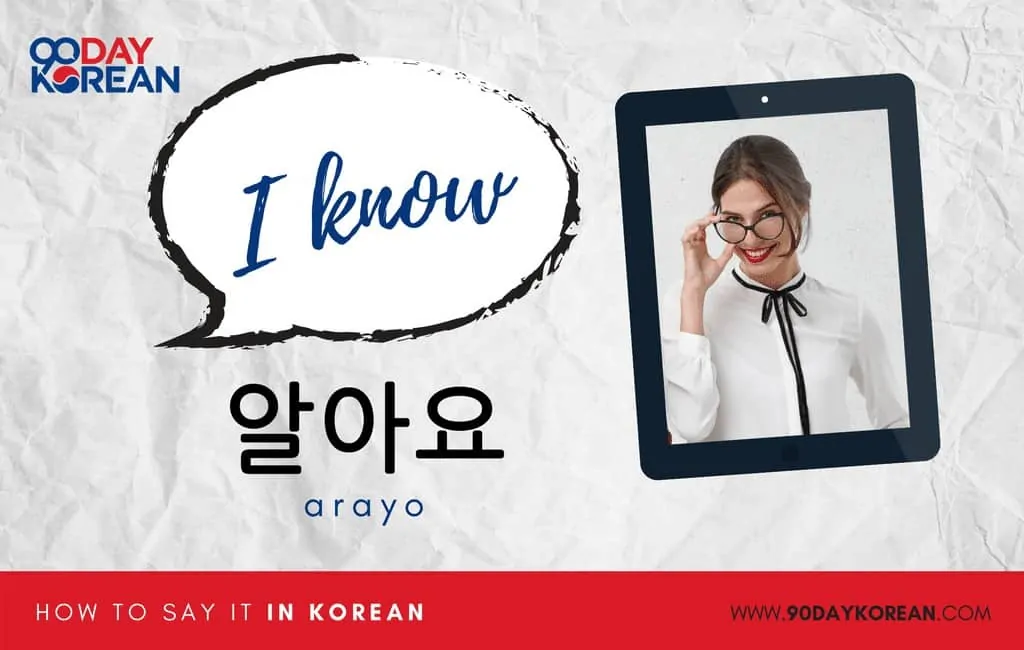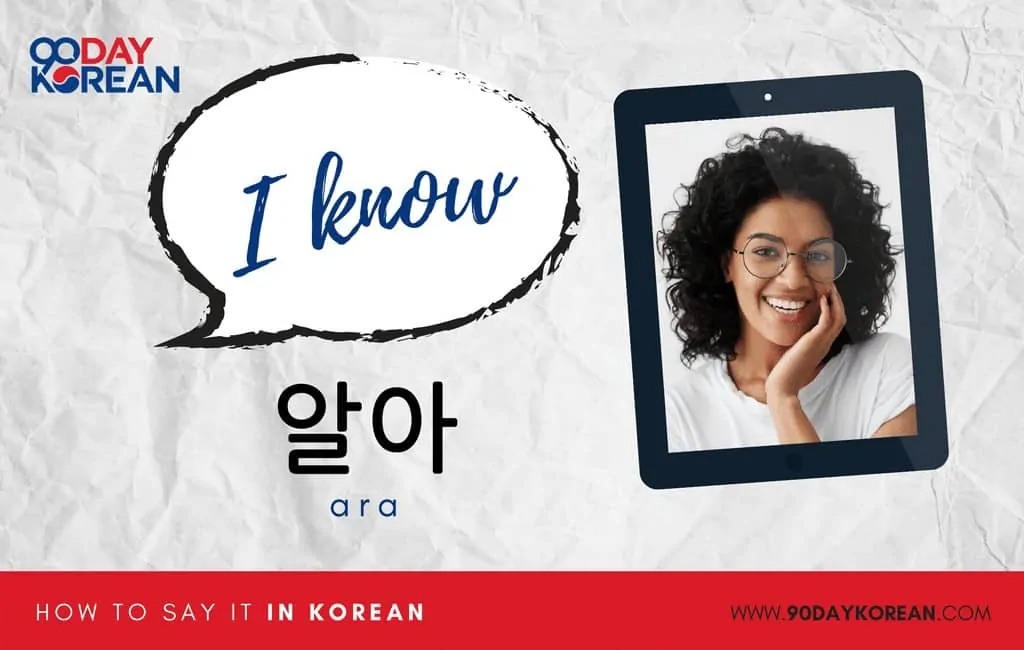You might already know how to say “I don’t know” in Korean, but wouldn’t it be great also to know how to say “I know” in Korean? After all, there will be many situations where this expression could be convenient for you to know.
Read on as we will teach you the different ways to say “I know” in Korean!
Contents
- 1 How to Say “I Know” in Korean
- 1.1 Formal “I Know” in Korean
- 1.2 Standard “I Know” in Korean
- 1.3
- 1.4 Informal “I Know” in Korean
- 1.5
- 2 Other terms related to “I Know” in Korean
- 2.1 “I got it” in Korean
- 2.2
- 2.3 “Okay” in Korean
The infinite form of the expression is the verb “to know,” which in Korean is 알다 (alda). To turn it into an “I know,” you need to drop the 다 (da) and attach the proper conjugation depending on which level of formality the expression will be used.
Below is a guide on how to say “I know” in Korean, with examples of each level.
Formal “I Know” in Korean
When you want to say “I know” in Korean when speaking to native speakers older than you, or someone you’re not familiar with, you can refer to these words.
1. 압니다 (amnida)
The first one is the formal conjugation –ㅂ니다 (-ㅂ nida) simply attached to the base of the verb “know,” 알 (al). As part of the group of verbs with the stem ending in ㄹ, the ㄹ disappears when the ㅂ gets attached as part of the conjugation.
However, as the ㅂ is followed by ㄴ, it will be pronounced with an ㅁ-sound instead. You won’t hear 압니다 (amnida) being spoken much outside of presentations and equivalent situations, though.
Sample Sentence:
A: 이 사람을 압니까? (i sarameul amnikka)
Do you know this person?
B: 네, 압니다 (ne, amnida)
Yes, I do (know this person).
2. 알고 있습니다 (algo itseumnida)
알고 있습니다 (algo itseumnida) has a very similar meaning, however, with this type of conjugation, you are trying to convey that you know the topic you are currently discussing in a deep manner. It sounds more natural to use in speech, however, than 압니다 (amnida) does.
3. 알겠습니다 (algetseumnida)
알겠습니다 (algetseumnida) can also be used as an “I know” response in some situations, but often its meaning is closer in alignment with that of “I got it” rather than “I know”, so keep that in mind before using it.
Sample Sentence:
A: 이 사람을 알고 있습니까? (i sarameul algo itseumnikka)
Do you know this person?
B: 네, 알고 있습니다 (ne, algo itseumnida)
Yes, I do know this person.
Can’t read Korean yet? Click here to learn for free in about 60 minutes!
Standard “I Know” in Korean
Here are some standard ways of saying “I know” in Korean that you’ll hear most often.
1. 알아요 (arayo)
If you attach the word 잘 (jal) in front of the verb, you can demonstrate that you know the topic well. For example, if you want to say that you speak Korean well, add 잘 (jal) in front of 알아요 (arayo), and you’re good to go!
Also, notice that when the consonant ㄹ is followed by a vowel, in this case, ㅏ, the pronunciation of the letter is closer to an “r” as opposed to “l.”
Sample Sentence:
A: 이 책을 알아요? (i chaegeul arayo)
Do you know this book?
B: 네, 알아요. (ne, arayo)
Yes, I do know this book.
2. 알고 있어요 (algo isseoyo)
Another standard way of saying “I know” 알고 있어요 (algo isseoyo). In this case, since ㄹ is followed by another consonant, it will be pronounced as “l” instead of “r.”
Informal “I Know” in Korean
Once you’ve become close to the person you are talking to, you can drop the 요 (yo) and speak informally like this.
1. 알아 (ara)
The informal way of saying “I know” in Korean is 알아 (ara). Note that you have to be careful if you speak to a stranger or a much older person (without getting their permission) using informal words because you’ll likely offend them.
However, to a close friend or equivalent, they’ll be delighted to have you use the informal version.
Sample Sentence:
A: 이 영화 알아? (i yeonghwa ara)
You know this movie?
B: 응, 알아. (eung, ara)
Yeah. I know.
Now you know how to say “I know” in Korean! To further your knowledge of the verb 알다 (alda), here are some other similar usages of the word that might come into use soon.
“I got it” in Korean
You can say 알겠어요 (algesseoyo) or 알겠어 (algesseo) to convey that you understood or you got what the other person was saying.
Sample Sentence:
A: 선생님 말 이해했어요? (seonsaengnim mal ihaehaesseoyo)
Did you understand what the teacher said?
B: 네, 이제 알겠어요 (ne, ije algesseoyo)
Yes, I got it now.
“Okay” in Korean
Like the word above, 알았어요 (arasseoyo) also has a meaning close to saying that you understood what you just heard. It can also simply be used to mean “Okay.”
Depending on who you are speaking with, you can say “okay” in Korean as 알았습니다 (aratseumnida), 알았어요 (arasseoyo), or 알았어 (arasseo).
“Araso” in Korean
The word “araso” in Korean can also be used to express that you understand what the other person is saying. It is written as 알았어, so its Korean romanization is also often written as “arasseo.” This is an informal way of saying “okay” or “I know” in Korean.
Sample Sentence:
A: 나한테 나중에 전화해 (nahante najunge jeonhwahae)
Call me later.
B: 알았어 (arasseo)
Okay.
Now that you know how to say “I know” in Korean go out and tell people about what you know! You can also mix this up with other Korean words or phrases. How about learning different Korean nouns next? These will be easy and helpful additions to the Korean vocabulary that you know!
In this short lesson, you will learn how to say “I know” in Korean. You may be surprised to hear that “I know” is used incredibly often in Korean conversations. In fact, if you’ve ever watched Korean dramas, you’ve probably heard the characters saying 알아요 (arayo) or 알았어 (araseo) many times. Below we will teach you the meaning of these words and the different ways to say “I know” in Korean, and provide plenty of example sentences to help you understand.
알다 [al-da] = To Know
The basic verb form “to know” in Korean is 알다 [al-da]. To say “I know” in Korean, you must take this basic verb form and conjugate it into the present tense.
알아요 [a-ra-yo] = I Know (Polite)
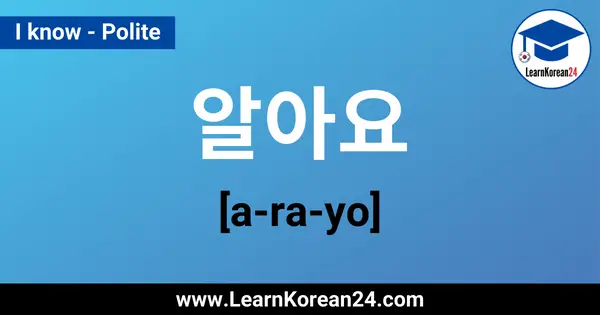
The most common way to say “I know” in Korean is 알아요 [a-ra-yo]. This is the verb 알다 (to know) conjugated into the present tense with the polite ending 요 attached. As this is the polite way to say “I know”, you can use this in most situations and, you will sound polite and respectful. Here is an example sentence using 알아요 [a-ra-yo]:
A: 그 사람을 알아요? [geu sa-ra-meul a-ra-yo?] = Do you know that person?
B: 네, 알아요. [ne, a-ra-yo] = Yes, I know (that person).
압니다 [am-ni-da] = I Know (Formal)
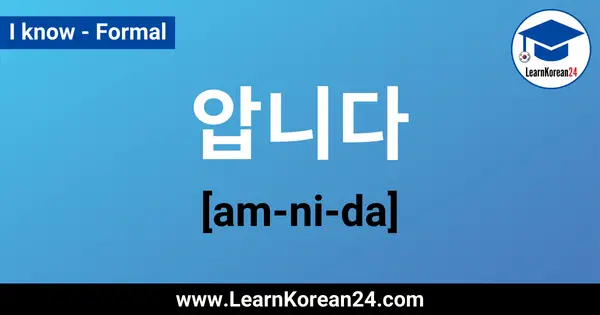
The formal way to say “I know” in Korean is 압니다 [am-ni-da]. As this is a formal expression, you can use it when you want to say “I know” to people older than you and in situations when you want to sound extra respectful. Here is an example sentence using 압니다 [am-ni-da]:
A: BTS 압니까? [BTS am-ni-kka?] = Do you know BTS?
B: 네, 압니다. [ne, am-ni-da] = Yes, I know (them).
알아 [a-ra] = I Know (informal)
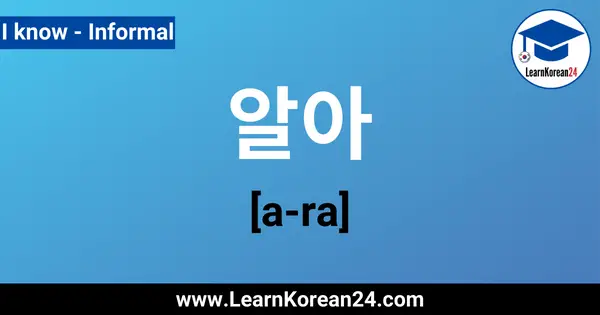
The informal way to say “I know” in Korean is 알아 [a-ra]. As you can see, there is no polite or formal ending attached, and so this expression should only be used with close friends/family and those much younger than you. In most cases, you should use polite or formal expressions. Here is an example sentence:
A: 포켓몬 알아? [po-ket-mon a-ra] = Do you know Pokemon?
B: 응, 알아. [eung, a-ra] = Yes, I know (Pokemon).
“I Got It” In Korean
The following expressions also use the verb 알다 (to know) but are used in situations where you want to say “I got it” or “I understood.“.
알았어 [a-ra-sseo] = I Got It (informal)
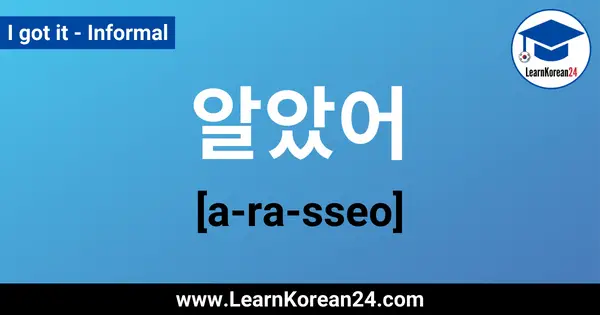
알았어 [a-ra-sseo], sometimes romanized as arrasseo or araso, means “I got it“. This expression is made from the verb 알다 (to know) conjugated into the past tense. So, 알았어 [a-ra-sseo] literally means “I knew it”, but a better translation in English is “I got it.” To help you understand what we mean, let’s look at an example sentence:
A: 오늘 저녁에 늦지 마! [o-neul jeo-nyeo-ge neut-ji ma] = Don’t be late tonight!
B: 알았어, 엄마. [a-ra-sseo eom-ma] = OK/Got It/Understood, mom.
As you can see, 알았어 [a-ra-sseo] also functions as “OK” in Korean in some situations.
알았어요 [a-ra-sseo-yo] = I Got It (polite)
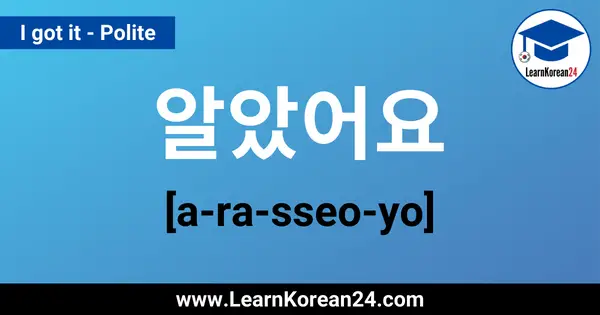
알았어 [a-ra-sseo] is an informal expression, and so you should not use this with strangers and people older than you. Instead, you should use the polite expression. To make 알았어 polite, simply add 요: 알았어요 [a-ra-sseo-yo]. Here is an example sentence:
A: 방금 이메일 보냈어요. [bang-geum i-me-il bo-nae-sseo-yo] = I just sent you an email.
B: 알았어요. [a-ra-sseo-yo] = OK. / Got it. / Understood.
알겠어요 [al-ge-sseo-yo] = I Got It (softer)
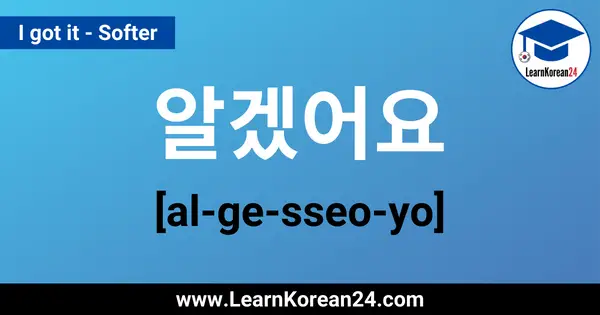
알겠어요 [al-ge-sseo-yo] is a softer way to say “I got it” in Korean. This expression is made up of the verb 알다 (to know) with the ending 겠 attached, which roughly translates as ‘guess’. So, 알겠어요 [al-ge-sseo-yo] is like saying, “I guess I understood.” / “I guess I got it.“.
So now you know how to say “know” do you know what you should learn next? Learn more useful Korean phrases or start our free online Korean course.
By now you might already know how to say ‘I don’t know’ in Korean, but wouldn’t it be great to also know how to say ‘I know’ in Korean? After all, there will be many situations where this expression could be very handy for you to know.
The infinite form of the expression is the verb ‘to know’ which in Korean is 알다 (alda). To turn it into an ‘I know’, you need to drop the 다 (da) and attach the proper conjugation depending on which level of formality the expression will be used in. Below is a guide on how to say ‘I know’ in Korean, with examples of each level.
*Can’t read Korean yet? Click here to learn for free in about 60 minutes!
Formal ‘I Know’ in Korean
1. 압니다 (amnida)
2. 알고 있습니다 (algo isseumnida)
3. 알겠습니다 (algesseumnida)
The first one is the formal conjugation –ㅂ니다 simply attached to the base of the verb ‘know’, 알 (al). As part of the group of verbs with them stem ending in ㄹ, the ㄹ disappears when the ㅂ gets attached as part of the conjugation. However, as the ㅂ is followed by ㄴ, it will be pronounced with an ㅁ-sound instead. You won’t hear 압니다 being spoken much outside of presentations and equivalent situations, though.
알고 있습니다 has a very similar meaning, however with this type of conjugation you are trying to convey that you know of the topic you are currently discussing in a deeply manner. It sounds more natural to use in speech, however, than 압니다 does.
알겠습니다 can also be used as an ‘I know’ response in some situations, but oftentimes its meaning is closer in align with that of ‘I got it’ rather than ‘I know’, so keep that in mind before using it.
Examples:
A: 이 사람을 압니까? (i sarameul amnikka?)– Do you know this person?
B: 네, 압니다 (ne, amnida) – Yes, I do (know this person).
A: 이 사람을 알고 있습니까? (i sarameul algo issseumnikka?)– Do you know this person?
B: 네, 알고 있습니다 (ne, algo issseumnida) – Yes, I do know this person.
Standard ‘I Know’ in Korean
1. 알아요 (arayo)
2. 알고 있어요 (algo isseoyo)
If you attach the word 잘 (jal) in front of the verb, you can really demonstrate that you know of the topic well. For example, if you want to say that you speak Korean well, just add 잘 in front of 알아요, and you’re good to go!
Also notice that when the consonant ㄹ is followed by a vowel, in this case ㅏ, the pronunciation of the letter is closer to an ‘r’ as opposed to ‘l’, whereas if it’s followed by another consonant, it will be pronounced as ‘l’.
Example:
A: 이 책을 알아요? (i chaek alayo?) – Do you know this book?
B: 네, 알아요. (ne, alayo) – Yes, I do know this book.
Informal ‘I Know’ in Korean
1. 알아 (ara)
Once you’ve become close with the person you are talking to, you can drop the 요 and speak informally like this. If you speak to a stranger or a much older person (without getting their permission) using informal words, you’ll likely offend them, but to a close friend or equivalent, they’ll be very delighted to have you use the informal version.
Example:
A: 이 영화 알아? (i yeonghwa ala?) – You know this movie?
B: 응, 알아. (eung, ala) – Yeah. I know.
And now you know how to say ‘I know’ in Korean! To further your knowledge on the verb 알다, here are some other similar usages of the word that might come in use soon.
Alternate Uses of ‘I Know’ in Korean
1. 알겠어요 (algesseoyo)/알겠어 (algesseo)
By using this word, you are conveying that you understood, aka you ‘got it’, what the other person was saying.
Example:
A: 선생님 말 이해했어요? (seonsaengnim mal ihaehaesseoyo?) – Did you understand what the teacher said?
B: 네, 이제 알겠어요 (ne, ije algesseoyo) – Yes, I got it now.
2. 알았습니다 (arasseumnida)/알았어요 (arasseoyo)/알았어 (arasseo)
Like the word above, 알았어요 also has a meaning close to saying that you understood what you just heard. In addition to that, it can also simply be used to mean ‘Okay’.
A: 나한테 나중에 전화해 (nahante najunge jeonhwahae) – Call me later
B: 알았어 (alasseo) – Okay
Now that you know how to say ‘I Know’ in Korean, go out and tell people about the things that you know!
*Want more Korean phrases? Go to our Korean Phrases Page for a complete list!
Hi guys, it’s your Korean teacher Jun! I know! I know it! I know him! These phrases are essence of our language life. It’s alway great to say it when you actually know something or when you just want to pretend to know something both lol. Today we are going to learn how to say I know in Korean
Warm Up Your Brain
You can really easily find the word ‘know’ in Korean dramas or songs. Can you guess what it is?
How To Say I Know in Korean
알아요
[a-rayo]
I know
Basic form : 알다
반말(informal non-honorific) form : 알아
Negative form with 해요 speech style : –
알아요 in Korean literally means that you know or understand something. Actually, 알다 seems like an informal verb of 이해하다 which means understand in Korean. 알다 can’t be used to showing you agree something like ‘I know right?’. 알다 can be very complicated when it’s used with other tenses.
In Past Tense
The past form 알았어요 is similar to ‘I knew’ but different. 알았어요 is used as ‘I understand’, ‘I understood’, ‘I got it’. You can’t use 알았어요 when you know something in the past but no longer. For that case, 알았었어요 is much more natural
In Future Tense
The future form 알거에요 is also different. 알거에요 already implies that the subject knows not the subject will know in the future (not always though). You can use to guess someone may know something. If you want to say ‘will know’, then ‘알게 될거에요’ sounds much more natural and clear.
How To Use
A: 저 사람 누군지 알아요?
Do you know who he is?
B: 제 친구예요!
He’s my friend!
A: 차차씨는 무슨 말인지 알거예요
Chacha knows what I’m talking
B: 그럼 차차씨한테 물어봐야겠네요
Then I should ask it to Chacha
A: 준씨 이거 뭔지 알아요?
Do you know what it is Jun?
B: 내 마지막 자존심
My last pride
Negative Form
몰라요
[molayo]
I don’t know
Technically, the negative form of 알아요 is 안알아요. However, that’s not much common, even Google spelling check says it’s a typo. 안알아요 sounds really unnatural to native Koreans’ ear. Use ‘몰라요’ to say ‘I don’t know’. It’s 100% natural.
Vocabulary Note
사람 [saram] : person / people / human-being
제 [je] : my [honorific]
친구 [chingu] : friend
무슨 [museun] : what
말 [mal] : word / speech / language
그럼 [geurum] : then
물어보다 [mureoboda] : to ask / to question
이거 [igeo] : this
내 [ne] : my [non-honorific]
마지막 [majimak] : late
자존심 [jajonsim] : pride
⠂Made in Korea
⠂Made of 100% Korean
⠂Adjusted as 100% Korean
⠂Ready to active Professor Mode
⠂Love to make people laugh as much as I love to teach
40%
1:1 MASTER CLASS.
DISCOUNT
DON’T MISS
THE SPECIAL OFFER
This Course Was $15
$15, maybe it’s nothing that you can earn after a couple of hours of labor. Or, maybe you have to work for full days to earn it only because of where you were born. And $15, It’s the average price of Korean textbooks. Life is unfair. But that’s why we can help each other, we are helping each other.
This Is Why I Published My Textbook For Free
I didn’t make it possible alone. A lot of people helped me and encouraged me and, of course, support me. I really appreciate my supporters, Team Junicorns. If my tutorials are helpful or if you want to share the same dream, join the Team Junicorns and support me to keep going.
Join Korean Jun Community!
Go Team Junicorn!
Why Korean Jun?
Super Real Korean
Do you really use some words such as ‘a little boy’, ‘lions’ or ‘carrot’ everyday? So, I’m not going to teach those.
The Magical POWER
The ancient magical language from the far far land. Learn Korean and it’ll make you look 500% more charming.
No Fake, No False
Some wise man in the internet age said ‘Don’t believe the internet’. However, in Korean Jun, any tutorial is triple checked! Accurate than any textbooks.
Build Korean Brain
Instead of forcing you to memorize words. I’m going to make you understand how Korean grammar really works. Learn Korean grammar triple faster!
Super Duper High-Quality
This is not just an internet free learning material. I spent years for the Core Grammar course.
At moments like these, I know the fingers are quick to point.
이런 순간에, 나는 안다 손가락이 빠르게 가리키고 있다.
But I know that you’re a good dude, You did.
I know. Sorry to drag you out here like this.
안다고 이렇게 여기까지 오게 해서 미안해.
One of us.- I know you were a federal prosecutor at one point,
And I know that you’re not here today.
그리고 난 네가 오늘 여기 없다는 걸 알아.
But
I
can tell you that I know what it means now.
하지만 이제는 그것이 어떤 뜻인지 안다고 말씀드릴 수 있습니다.
And believe me, I know very well how to search.
우리는 검색을 아주 잘 안다고 생각한다.
You don’t ever say anything, and I know—.
I know. Something dirty in it.
I know that you believe- It was.
난 네가 그 말을 믿는다는 걸 알아.
I know that, Mrs. Grasso. A good father.
저도 압니다, 그라소 부인 좋은 아빠에요.
I’m… I’m just sayin’, I know his pain.
알아 -난 그냥, 그의 아픔을 안다고.
I’m sorry. I know this is hard for you.
죄송 해요. 이게 너에게 힘든 일이라는 것을 나는 안다.
And I know you can never deny the truth.
그리고 난 네가 절대 진실을 부정할 수 없다는 걸 알아.
A good father. I know that, Mrs. Grasso.
저도 압니다, 그라소 부인 좋은 아빠에요.
Every time
I
think I know exactly who you are,
매번 내가 정확히 오빠를 안다고 생각하면.
All this is to say, I know granola!
아, 이거 몰라 «Grandio ‘이다!
I know how much you love your son.
난 네가 아들을 얼마나 사랑하는지 알아.
I know it is, but
I
said
I
would get him.
I know what
I
will be doing this weekend!
It means, McClane, that I know why you’re here.
맥클레인 네가 왜 왔는지 안다고.
I know, but he seemed fine tonight.
몰라, 하지만 그는 오늘밤 아름다웠어.
나는 네가 거기에서 무엇을 했는지를 안다.».
빌어먹을 그걸 몰라? — 죄송해요.
I’m not stupid, Samar, I know you’re plotting something.
나 바보 아니야 꿍꿍이 꾸미는 거 다 안다고.
I know. That’s why we’re going to do an exam,
Results: 8930,
Time: 0.0352



